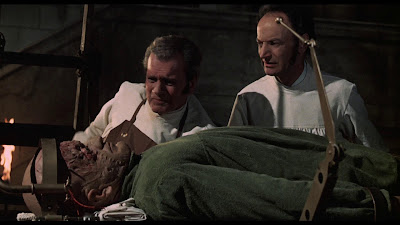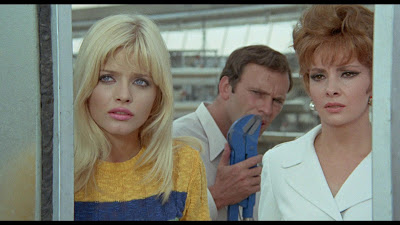There is a new Blu-ray company in the UK - Nucleus Films (headed by Marc Morris and Jake West), launched not long ago with unique, limited edition Blu-rays of Jess Franco's THE EROTIC RITES OF FRANKENSTEIN and THE DEMONS. Now I must bring your attention to the latest two releases in their "European Cult Cinema Collection": Mel Welles' LADY FRANKENSTEIN (1972) and Giulio Questi's DEATH LAID AN EGG (1968) - both of which are being made available for the first time in their original director's cuts (in both cases, widely suppressed) and their more familiar theatrical release versions. These are both Limited Edition pressings of only 1000 copies. I understand that popular editions will also be issued at some point, but I imagine with fewer extras - and the extras here add immeasurably to their enjoyment.
Readers of VIDEO WATCHDOG may remember that, back in Issue #78, we ran a lengthy interview with writer-director-actor Mel Welles, touching on his entire career from acting for Roger Corman, mentoring Michael Reeves, working in the Italian dubbing industry, and also working as a director on several films made abroad. I also wrote for that issue a detailed reconstruction of LADY FRANKENSTEIN, which has generally been available for screening since its 1973 release in an 84 minute reduction supervised by Roger Corman, who released it through his then-fledgling company New World Pictures. Now you can see for yourselves the 15 minutes that were cut from the film and which reinforce its standing as a more serious accomplishment. The 99 minute version has been transferred from the original camera negative and is presented in both Italian and English (its primary language, as Welles assembled his cast with post-synchronization in mind) 24 bit LPCM audio with optional English subtitles.
The extras include the 84 minute version; an informative and entertaining audio commentary for the director's cut by Alan Jones and Kim Newman; "The Truth About LADY FRANKENSTEIN," a 2007 German television documentary (42m) including extensive on-camera interviews with Welles, Rosalba Neri and Herbert Fux; "Piecing Together LADY FRANKENSTEIN," a 35m featurette in which historian Julian Grainger recounts the film's history; "The Lady and the Orgy," an 8m featurette about Mel Welles' spell in Australia, during which time he reissued the film as part of a theatrical Spook Show; alternate "clothed" footage shot for Spain and international TV broadcasts; a photo-novel; a list of BBFC cuts; a stills and paper gallery; video art; a brace of international trailers, TV spots and radio spots - literally everything you could possibly want related to this title! In case you're wondering, none of the extras mention the film's similarity to the Bill Warren/Jack Sparling story "For the Love of Frankenstein," which appeared in VAMPIRELLA #4 - published early enough (April 1970) to have been a direct influence on Welles' and Edward di Lorenzo's screen story.
DEATH LAID AN EGG is another kind of film altogether. For decades, since fans started trading bootleg cassettes back in the early '90s, it has accrued a reputation as a strange and arty giallo film, but I don't think it's really that, at all. It's a willfully idiosyncratic film, though - if you stick with it - it tells its wacky story fairly directly. If we accept that it first opened in January 1968, it predates what we know as the giallo, what the giallo became after the arrival of Dario Argento in 1969. Dissociated from a few identifiable Argento tropes, it's actually an adroit political satire about the amorality of big business. It opens with a fascinating series of random images, thrown out as if the camera is a roulette ball as yet undecided who our protagonist is going to be. These are the guests of the so-called Highway Motel (actually Rome's lavish, then-new Rome Hilton hotel - the same place where Franco & Ciccio work as bellboys in Mario Bava's DR. GOLDFOOT AND THE GIRL BOMBS): an exhausted man self-administering eye drops, a man greeting the morning by committing suicide, and a Peeping Tom, all getting repeated screen time until the scenarist settles on Marco (Jean Louis Trintignant), who seems to be murdering a call girl. Marco, whose bloody transgression is witnessed by the Peeping Tom, leaves the "motel" as efficiently as the businessman he is. He's married his way to an executive position in "The Association," a bizarre company whose goal appears to be making chicken a staple not only of daily diet but existence. Marco's born-to-money wife Anna (Gina Lollobrigida) is pushing their company into the future, automating the murder machine that is their business (expect some graphic chicken processing images) to the stewing anger of its former workers, gathering like dark clouds outside their fences, and developing a weird sort of living, headless, wingless McNugget mutation to reduce their costs.
Nucleus includes the shorter "giallo version" in their set, but they were able to locate the last surviving 35mm print of its original full-length cut and incorporate that material (again, 14 minutes' worth) with their master from the original camera negative of the shorter version. Finally seen as its director intended, it is plain to see that Questi was making a film about how we are bombarded as a society by Big Business, about the obscene results that occur when the human (and therefore animal) elements are excised from industry. Marco's plight is that of an executive who is in many ways morally debased but cannot agree to the increasing amorality of his business. One of the key excisions now restored is the complete performance of Renato Romano, who plays Luigi, introduced as an old friend of Marco's, but who - in my reading of the picture - is gradually revealed as his reproaching alter ego - the Marco he might have become had he taken a different direction in life. (Looking like a fatter, more disheveled Trintignant in a plaid jacket, Luigi makes vague references to roads that split into two, is able to recognize Marco in the dark and find his way to his home without knowing his address, etc.) There is no need to spoil the ending, but the film's giallo status is disqualified in an interesting way, so there is really no intention of "deconstructing" a genre that had actually yet to find many of the tropes improvised here. This is an aberration of the truncated cut.
Director Giulio Questi - writing the script with Franco Arcalli (who went on to script Louis Malle's "William Wilson" for SPIRITS OF THE DEAD, ZABRISKIE POINT and THE PASSENGER for Antonioni, Liliana Cavani's THE NIGHT PORTER, Bertollucci's THE CONFORMIST and 1900, Sergio Leone's ONCE UPON A TIME IN AMERICA and numerous other A-list curiosa) - could rather be said to be deconstructing the "Continental Op" films of the 1960s, given the film's antiseptic set design, wild costumes, and the absurd central images of the Chicken and the Egg, emblems of the endless riddle of which came first. (The film also features Ewa Aulin, whom I once identified as the Queen - if it has one - of "Continental Op.") Its attention to the perversions of secretive companies and businessmen, the amorality of science and business, weird mutations and the personalities that breed them, seem neatly yet independently coincidental with David Cronenberg's earliest work in STEREO (1969) and CRIMES OF THE FUTURE (1970). This relationship is further emphasized by its characters' progressive dissociation from humanity (pay close attention to Lollobrigida's random soliloquies about yearning for some kind of physical transformation - very Cronenbergian), and the fractious, atonal music score of avant-garde composer Bruno Maderna.
In this case, the extras include the 91 minute giallo edit; another Alan Jones/Kim Newman commentary (quite invigorating, sometimes cheerfully confused idea fest, in which Kim fires off a convincing association between the ending of this film and another better-known film in Arcalli's filmography); Italian and English 24 bit LPCM audio with English subtitles; "Discovering Questi," a 20-minute monologue by BFI disc producer James Blackford about his interesting personal journey with Questi's slippery filmography; "Sonic Explorations" (24 minutes), in which DJ Lovely Jon discusses Bruno Maderna's contribution to the film with real passion; a 13-minute archival interview with Questi; a 5-minute appraisal of the film from Italian critic Antonio Bruschini; a list of the BBFC censor cuts; and all the trailers and paper galleries you could want - plus a reproduction of the special DEATH LAID AN EGG issue of Craig Ledbetter's fanzine EUROPEAN TRASH CINEMA, including reviews of the film by first-time viewers Stephen R. Bissette, Jeff Smith and yours truly. I was relieved to see that my review has held up well, and my opinion of the film hasn't changed all that much, though the restored footage gives me a clearer notion of its intentions.
Both films were financed by fund-raisers and complete alphabetical Thank You lists of the sponsors are also included. This level of work must be encouraged and supported, so hasten on over to nucleusfilms.com.
(c) 2018 by Tim Lucas. All rights reserved.
















